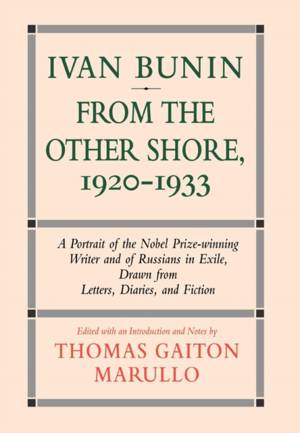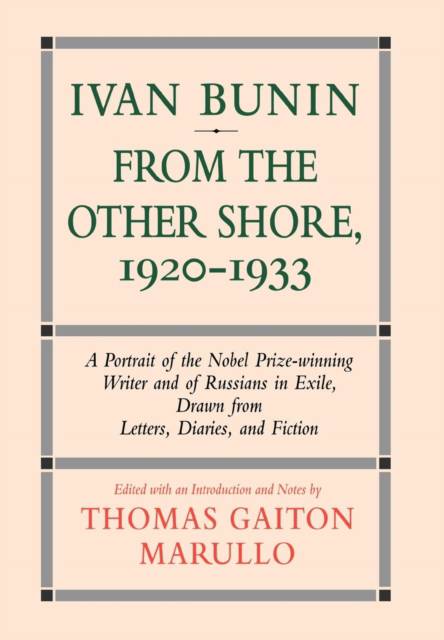
- Afhalen na 1 uur in een winkel met voorraad
- Gratis thuislevering in België vanaf € 30
- Ruim aanbod met 7 miljoen producten
- Afhalen na 1 uur in een winkel met voorraad
- Gratis thuislevering in België vanaf € 30
- Ruim aanbod met 7 miljoen producten
Zoeken
Ivan Bunin: From the Other Shore, 1920-1933
A Protrait from Letters, Diaries, and Fiction
Thomas Gaiton Marullo
€ 53,45
+ 106 punten
Omschrijving
In this second volume of his major work on Bunin, the neglected master of Russian letters, Thomas Marullo recreates his life in exile, chiefly in Paris, after escaping from his newly bolshevized country in 1920. Drawing from Bunin's correspondence, his diaries, and his stories, and translating most of these materials into English for the first time, Mr. Marullo gives us a vivid picture of a man suddenly and agonizingly without a country. Bunin's life and art, which depended so heavily on traditional Russian values, seemed to be overthrown in a moment, and the writer found himself marooned amidst Western culture, clinging to his old ideals. Through his writings we are also provided a window on the lively but despairing and often fractious community of Russian emigrés in Paris in the twenties, which included Stravinsky, Rachmaninoff Chafiapin, Prokofiev, Chagall, Kandinsky, Pavlova, Diaghilev, and Zamyatin. The volume ends in 1933, when Bunin became the first Russian to receive the Nobel Prize in literature. Mr. Marullo's first volume, Ivan Bunin: Russian Requiem, was widely acclaimed. Gary Saul Morson of Northwestern wrote: "It engages the reader from the first page ...Marullo has an eye for the perfect quotation." Ruth Rischin, in the Russian Review, described the book as "elegantly crafted... a serious achievement."
Specificaties
Betrokkenen
- Auteur(s):
- Uitgeverij:
Inhoud
- Aantal bladzijden:
- 347
- Taal:
- Engels
- Reeks:
Eigenschappen
- Productcode (EAN):
- 9781566630832
- Verschijningsdatum:
- 1/04/1995
- Uitvoering:
- Hardcover
- Formaat:
- Genaaid
- Afmetingen:
- 161 mm x 237 mm
- Gewicht:
- 598 g

Alleen bij Standaard Boekhandel
+ 106 punten op je klantenkaart van Standaard Boekhandel
Beoordelingen
We publiceren alleen reviews die voldoen aan de voorwaarden voor reviews. Bekijk onze voorwaarden voor reviews.











